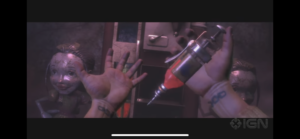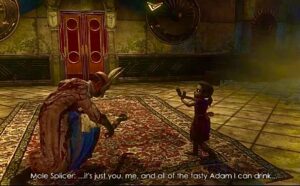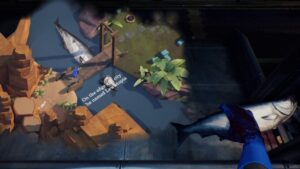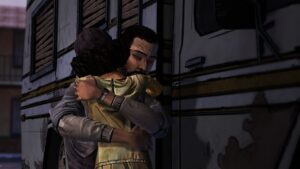The Future of Storytelling in Gaming
When it comes to various single-player games with an in-depth story, the immersion factor through gameplay plays a significant role in interpreting the game’s overarching themes. In games like Bioshock and What Remains of Edith Finch, the immersion aspect of their gameplay mechanics enhances the interpretation of the themes and messages covered between the lines of the game’s main story. In both games, Bioshock and What Remains of Edith Finch, their game mechanics assist the theme relating to its commentary regarding the real-world issue of drug addiction. Bioshock’s gameplay mechanics are powered by an in-game substance called ADAM, which the player needs to complete the game efficiently. As for What Remains of Edith Finch, the player controls various characters within the Finch family leading up to their unfortunate demises, which attributes to the heavy drug use of one of the characters I will be covering.

What is ADAM?
For those who may have never played Bioshock, you may be asking yourself what exactly is ADAM’s importance to the game. According to Bioshock’s fandom wiki, “ADAM is a chemical substance that can rewrite genetic material, allowing the user to alter their bodies, their genetic makeup and their natural abilities without any direct limits whatsoever aside from their imagination.”. The website also described that ADAM does this by supporting the formation of potent stem cells that can differentiate into any cell type, including various unnatural ones. In one of the audio logs hidden throughout the game (another mechanic), it was shared with the player that the discovery of ADAM was catastrophic given its negative effect on the city of Rapture.
“ADAM acts like a benign cancer, destroying native cells and replacing them with unstable stem versions. While this very instability is what gives it its amazing properties, it is also what caused the cosmetic and mental damage. You need more and more ADAM just to keep back the tide. From a medical standpoint this is catastrophic. From a business standpoint, well…… Fontaine sees the possibilities.
The text preceding this paragraph was a transcript of Dr. Tenenbaum’s description of ADAM’s capabilities and the damage it has caused the inhabitants of Rapture. The audio log mentioned that ADAM caused users cosmetic and mental damage due to heavy addiction to the substance. Those effects may seem minor at the surface, but there are various side effects from the drug. Throughout my research, there was one side effect that caught my eye the most, hallucinations. As the player progresses through the story, they learn more and more about the back story of the city of Rapture and the main character through various forms of media. Jack, the main character that the player is controlling who is himself a user of ADAM. Later in the story, Jack begins to encounter ghosts that represent the past events within the city. Regardless of how one plays Bioshock, they have to consume ADAM to get through the game. Our character eventually suffers from hallucinations and other side effects like memory loss, paranoia, and varicose veins, which inadvertently represent drug addiction in the world of Bioshock.
ADAM’s discovery was a complete accident as it was initially intended for the betterment of Rapture’s citizens. In Hitchcock’s article about ADAM, it states that, “the earliest known human contact with any of the sea slugs occur when one bit a dockworker in Rapture who had previously lost the use of his hand to a serious injury. Shortly after being bitten by the slug, his hand unexpectedly recovered. The strange occurrence got the attention of one of Rapture’s scientists, Dr. Brigid Tenenbaum. When she spoke to the dockworker, he still had the sea slug, giving Tenenbaum a lead to begin her research.”. Dr.Tenenbaum eventually discovered that the substance could heal and change the consumer’s genetic makeup; she saw this as a major medical advancement. However, others viewed this as a business opportunity. Individuals like Frank Fontaine took advantage of this business opportunity and mass-produced the substance to the people of Rapture, marketing the substance as “evolution in a bottle” because it provided Rapture’s citizens a fast and easy method to change their bodies’ physical and cosmetic features. Demand for ADAM eventually up ticked as users of the substance started to gain an addiction to ADAM. The main antagonist Frank Fontaine exploited this addiction, which leads to the story’s primary conflict between him and the other main antagonist Andrew Ryan which in simple terms was a struggle for power to pursue their own selfish goals.

Bioshock
In Bioshock, while still working for Atlas (Frank Fontaine), the player eventually runs into Dr. Tenenbaum. This encounter is also the player’s first time seeing a little sister. “What is a little sister” you may ask. A little sister was a key factor in Fontaine’s mass production of ADAM. They were used to recycle the substance from its past users’ dead bodies and hold it within their bodies for exponential redistribution. Atlas advises the player to kill the little sister at first sight, letting them know that they contain the extra ADAM that the player desires, which gives them more abilities. Dr. Tannenbaum shortly appears as a player is currently watching a splicer attempt to kill the little sister. She then kills the splicer and threatens that the player will follow the same fate if he attacks the little sister. She offers an alternative for not killing the little sisters by giving you a smaller amount of ADAM and gifts that come later in the game. At this point, the player is given a choice each time they encounter a little sister on which side to listen to. Upon Learning this, the player must consider whether it is right or wrong to kill the little sisters to obtain more ADAM. With this knowledge, if the player decides to kill the little sisters, it now makes them no better than the splicers who habitually commit such immoral acts to obtain their fix of ADAM. The actions of the splicers are similar to how individuals in the real world who are entirely consumed by their addiction resort to extreme measures to obtain the next fix of their preferred drug. On the other side, a simple connection will be abstaining from using ADAM or committing immoral acts to get more ADAM in Bioshock. This ties to general abstinence from substance abuse.
What Remains of Edith Finch
On the contrary of Bioshock, What Remains of Edith Finch’s story does not revolve around one gameplay mechanic. The only thing that remains constant throughout the game is the words of the controlled character helping the player navigate through each level. Therefore, both games are pretty different. What Remains of Edith Finch covers the stories regarding each family member of the finch family and the causes of their death. Since we talked about how gameplay mechanics assist the game’s commentary on real-world drug addiction, we will be covering one of the characters of the finch family Lewis, Edith’s older brother.


In What Remains of Edith Finch, the character Lewis represents the effects of withdrawal from addiction. Upon entering Lewis’s room, it is apparent that he was a pothead and was addicted to the drug from the presence of the mass amount of paraphernalia in his room and the main character’s narration on her relationship with him. Once we begin reading the psychiatrist’s letter, his story begins from her perspective. The psychiatrist’s letter is then read to the player as they control Lewis at his cannery job. From the start, the player learns that Lewis was newly sober and that being so caused him to realize the monotony of his daily life. This realization causes a pattern of his mind wandering at the most random times. The player’s job as Lewis is to cut the salmon heads under the guillotine during this level using the right stick to control Lewis’s right hand. Eventually, after doing this task for a bit, the left side of the player screen fogs up. At first, the player may not realize what is going on. However, at some point, it becomes apparent that the fog covering the left side of the player’s screen is a daydream of Lewis’s, and the player can control this daydream by moving the fantasy character within it with their left stick. When prompted, the player learns that they cannot progress through the fantasy without cutting more salmon. As the player progresses through his daydream, the screen gets covered more and more, causing the player to see less of what they are doing as far as cutting the salmon. Eventually, the player loses sight of what they are doing in the real world, meaning they too are mindlessly working at the canner, thus demonstrating they have also disconnected from the real world in the same fashion as Lewis. Soon enough, the player will see the body of Lewis in the real world and its unconsciousness to the real world. Now the player can progress through the fantasy with no holdups, which eventually leads the player to the ending of the dream where Lewis is crowned as king, requiring him to bow with head down. Unfortunately for Lewis’s case, doing that was the real-life equivalent of him putting his head under the guillotine used to cut the fish.
This level’s mechanics made the player use two different halves of the controller to control Lewis’s imagination and his real-life job simultaneously, which becomes second nature to the player without any need for visual feedback to his reality. The player was put into the shoes of Lewis Finch, who was actively suffering from his newfound abstinence from drug abuse which he initially gained a heavy dependence on. This was the game’s representation of one of the struggles of life, post-addiction. That being that newly recovered users have a hard time finding an alternative to the drug’s sensation it initially provided them. Whatever is in place for the addiction may not fill the void that was created from the user’s newfound abstinence.
Gaming is placed under a broad misconception that it only serves as a pastime and contains little to no literary value. Gaming has evolved since its invention, growing from simple text games and Minigames to games with full-fledged stories and titles meant to simulate counterparts of the real world. Like movies and books, gaming can depict any theme or lesson that the writer sees fit in the same fashion, if not even better, when gaming and literary tools are blended throughout a game’s story. With now, gameplay mechanics being what writers for gaming should look more into for making much more compelling stories that will surely leave lasting impressions like Bioshock and What Remains of Edith Finch.









 Each aspect of a game is a puzzle piece, and although you might be able to make out what the picture is when some of the pieces are missing,
Each aspect of a game is a puzzle piece, and although you might be able to make out what the picture is when some of the pieces are missing,  However, I believe the most valuable thing that changed my mind about my approach to video games this semester was hearing my fellow classmates’ stories and opinions about games they have played. Being able to listen to them tell their stories with such passion and opinions really made me feel like I was missing out on an entirely different side of video games.
However, I believe the most valuable thing that changed my mind about my approach to video games this semester was hearing my fellow classmates’ stories and opinions about games they have played. Being able to listen to them tell their stories with such passion and opinions really made me feel like I was missing out on an entirely different side of video games.  Bioshock Infinite is a perfect example of this. If you were to ask me to play this game a couple of months ago,
Bioshock Infinite is a perfect example of this. If you were to ask me to play this game a couple of months ago, 


